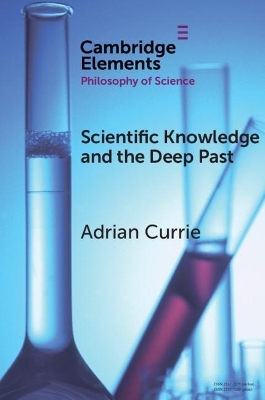
Scientific Knowledge and the Deep Past
History Matters
Seiten
2019
Cambridge University Press (Verlag)
978-1-108-73055-6 (ISBN)
Cambridge University Press (Verlag)
978-1-108-73055-6 (ISBN)
Scientific Knowledge and the Deep Past: History Matters is an accessible tour of the philosophy of the historical sciences. Examining how dinosaurs grew and the emergence of flowering plants in the mid-Cretaceous, it analyses the relationship between knowledge and the past, explaining why narratives play a prominent role in history.
Historical sciences like paleontology and archaeology have uncovered unimagined, remarkable and mysterious worlds in the deep past. How should we understand the success of these sciences? What is the relationship between knowledge and history? In Scientific Knowledge and the Deep Past: History Matters, Adrian Currie examines recent paleontological work on the great changes that occurred during the Cretaceous period - the emergence of flowering plants, the splitting of the mega-continent Gondwana, and the eventual fall of the dinosaurs - to analyse the knowledge of historical scientists, and to reflect upon the nature of history. He argues that distinctively historical processes are 'peculiar': they have the capacity to generate their own highly specific dynamics and rules. This peculiarity, Currie argues, also explains the historian's interest in narratives and stories: the contingency, complexity and peculiarity of the past demands a narrative treatment. Overall, Currie argues that history matters for knowledge.
Historical sciences like paleontology and archaeology have uncovered unimagined, remarkable and mysterious worlds in the deep past. How should we understand the success of these sciences? What is the relationship between knowledge and history? In Scientific Knowledge and the Deep Past: History Matters, Adrian Currie examines recent paleontological work on the great changes that occurred during the Cretaceous period - the emergence of flowering plants, the splitting of the mega-continent Gondwana, and the eventual fall of the dinosaurs - to analyse the knowledge of historical scientists, and to reflect upon the nature of history. He argues that distinctively historical processes are 'peculiar': they have the capacity to generate their own highly specific dynamics and rules. This peculiarity, Currie argues, also explains the historian's interest in narratives and stories: the contingency, complexity and peculiarity of the past demands a narrative treatment. Overall, Currie argues that history matters for knowledge.
Introduction; 1. History and evidence; 2. The nature of the deep past; 3. Historical explanation; Concluding discussion – what are sciences of the deep past about?
| Erscheinungsdatum | 12.08.2019 |
|---|---|
| Reihe/Serie | Elements in the Philosophy of Science |
| Zusatzinfo | Worked examples or Exercises; 1 Halftones, black and white |
| Verlagsort | Cambridge |
| Sprache | englisch |
| Maße | 153 x 230 mm |
| Gewicht | 160 g |
| Themenwelt | Naturwissenschaften ► Geowissenschaften ► Mineralogie / Paläontologie |
| ISBN-10 | 1-108-73055-8 / 1108730558 |
| ISBN-13 | 978-1-108-73055-6 / 9781108730556 |
| Zustand | Neuware |
| Haben Sie eine Frage zum Produkt? |
Mehr entdecken
aus dem Bereich
aus dem Bereich
Buch | Softcover (2024)
Shaker (Verlag)
CHF 27,70
An Optimist's Guide to the Historical Sciences
Buch | Softcover (2024)
MIT Press (Verlag)
CHF 48,35


